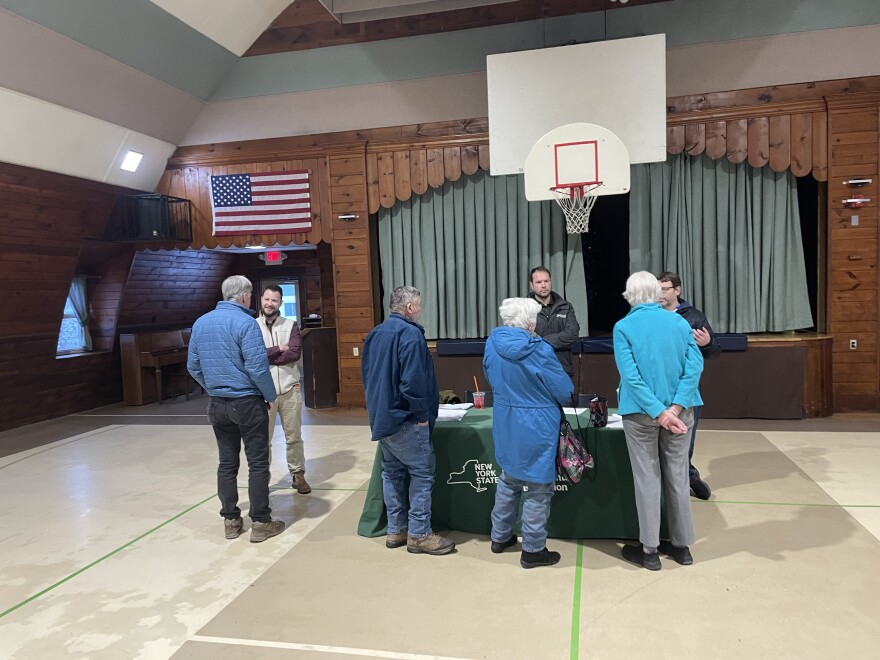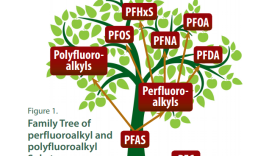New York State health and environmental officials held a meeting in Petersburgh last week to update residents on the years-long investigation into PFAS contamination in the Rensselaer County community.
PFAS contamination of water supplies in the Town of Petersburgh has been linked to a facility operated by Taconic. The company agreed to a $23.5 million settlement with the town in 2021.
Under a 2016 consent order with the New York State Department of Environmental Conservation, Taconic has been investigating the contamination. To date, point-of-entry treatment systems have been installed in nearly 200 homes, and the town’s municipal water supply has also been outfitted with a filtration system.
But as environmental sampling has continued for years, some residents are frustrated with the pace of the investigation.
Town resident Carol Hovland says she doesn’t feel her questions have received adequate answers from the state.
“I think it's been going on so long, since 2016, that it’s one of these things where this is still very important, and people have moved away because of it, you know, but it’s hard for people to keep thinking about it and wanting to be informed about it, because we haven't had any great progress,” Hovland said.
Ian Beilby, an engineer with the DEC, says over the years, the scope of the study has expanded. Beilby says such investigations into pollution can take several years. He expects it will take two more years for the Petersburgh investigation to determine the extent of the contamination.
“Some of the contamination was disposed of just on site through liquids, and some of it was disposed through the air,” Beilby said. “So, we've expanded the investigation, to capture both of those routes of disposal. The disposal through the air route, is the one that has really led us to expand from an aerial perspective. And that we can't really put a distance on it, but it's extended close to a mile in some directions. But I think what we would also want to stress is that we have continued to collect soil and water samples and sediment samples, as well as biological samples.”
Beilby says PFAS compounds PFOA and PFOS have not been used at Taconic since the early 2000’s. But the chemicals, which can cause ill-health effects including cancer, are persistent in the environment. Petersburgh is just one of a number of communities in the Northeast and nationwide grappling with the contamination.
The DEC says it is monitoring Taconic’s air emissions. The Petersburgh landfill is being investigation as a potential state Superfund site.
Benjamin Potter is DEC’s regional air pollution control engineer. He says he is waiting on a final report from a recent air emission test.
“There's a lot to look at and evaluate to make sure they did it correctly,” Potter said. “We want to make sure they're operating in conditions that they normally operate at, so that they're always in compliance. So, there's a lot to look at not just what's coming out of the stack, but how they are operating during that test.”
Dr. Gary Ginsberg, director of the New York State Health Department’s Center for Environmental Health, says the DOH works with the DEC to ensure sampling is adequate and helps interpret the data.
“We're part of the decision-making process on reviewing interim measures and final remediation plans to just make sure that as all of these decisions are made that there's a clear view of public health,” Ginsberg said.
Ira Share is a Petersburgh resident and a member of the town's C8 Committee. (C8 is another way to refer to PFAS.) Share says while he “appreciates the science” behind the investigation, he wishes it could move along more quickly.
“We want a thorough investigation,” Share said. “We want great data. And it's just frustrating when you live in it. But you want it done right? You want it done once and done. Right? That's what we're hoping for. But we're here, we're still here, we haven't gone anywhere. Our water gets tested, a lot of people have water filters. So that's that was from pretty much the get go. So that was great. But, you know, our soils being tested, they tested produce this summer from our gardens, because there's a lot of growers out here, we try to grow berries and food and, you know, eat out of our gardens. And we haven't heard anything about that yet.”
DEC says it is awaiting samples as part of an agricultural study to identify potential PFAS exposure pathways through food.
Taconic declined to comment on its remediation efforts.




